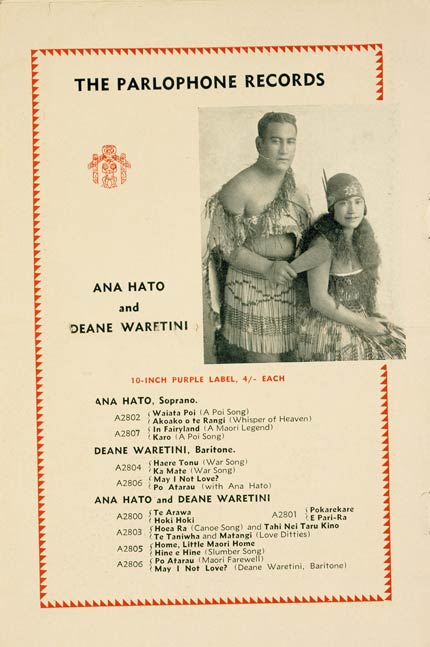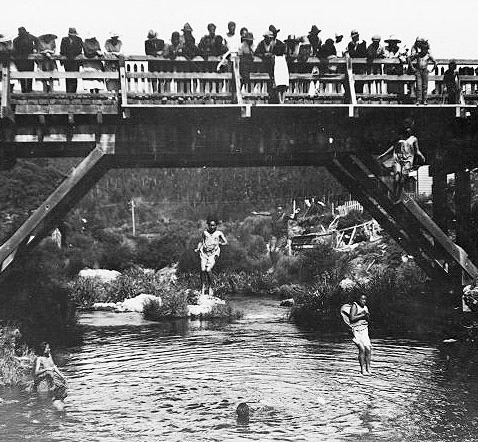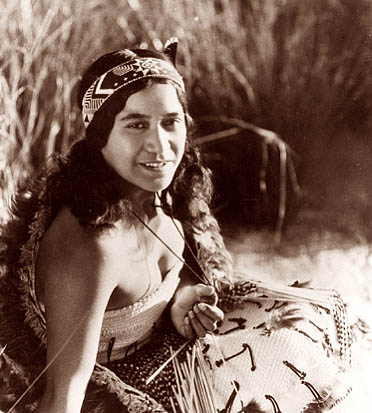|
Ana Hato is really the person responsible for this mixed-culture folk song website. I'm an old Pakeha, but my website is bulging with Maori songs that are loved by both Paheha and Maori. When I was a pre-schooler in the early 1940s, there were only two radio stations, and not many New Zealand recordings, so we frequently heard Ana and her cousin Deane Waretini singing Pokarekare Ana, Po Atarau, Hoki Hoki, Matangi, Hine e Hine, Tahi Nei Taru Kino, Hoea Ra, Waiata Poi and E Pari Ra. 
My Irish-born Aunty May had the music sheets of most of them on top of her piano, alough we sang Come Oh Maidens "...Gaily our canoe shall glide..." to the tune of Hoea Ra. From the mid-1920s until her death in 1953, Ana Hato was one of this country's most loved singers. She was our folk singer, singing songs that united Maori and Pakeha during the Great Depression and World War Two. |
Diving for pennies
|
Ana and Deane took music lessons from Mrs Banks, the wife of the headmaster at Whakarewarewa School. But for the two cousins there was always singing - at home and in community gatherings, at the baths and bridge for tourists, and in the church choir. Rotorua was also where Maori had first set up their own concert parties - entertainment groups that performed a range of Maori songs and dances influenced by European musical forms and tastes. |
New
Zealand's first recording star
|
These
featured Ana, accompanied in some songs by Deane, a
chorus (probably the Rotorua Maori Choir), and the
pianist Mollie Mason (Te Mauri Meihana). Deane
recalled the "... small
and totally inadequate room where our first
records were made." |
Famous but
never rich
|
Ana also continued to perform at concerts and
fundraising events. By 1933, she was the leader of
the Tuhourangi Concert Party.
During World War II she led hundreds of concerts to
raise money for the war effort. Her husband, Pahau
Raponi, died in a German POW camp during that time. In 1963 Deane Waretini wrote, "Today I am an ageing old man. Ana has been dead many years. It is my sincere prayer that the ability to introduce into their singing variations of tone which makes Maori singing unique, is never lost to our race." Adapted from this Te Papa webpage |
References
|
1963, Armstrong, Alan. 'The Great Songs of Ana
Hato and Deane Waretini.'
Te Ao Hou. No. 48 1968, Dennan, Rangitiara, with Annabell, R. Guide Rangi of Rotorua. Christchurch: Whitcombe & Tombs 1995, Kiwi Pacific Records and National Library of New Zealand. Ana Hato raua ko Deane Waretini CD liner notes. |
 Ana
Matawhaura Hato was born at Ngapuna, Rotorua, on 30
December 1907, the daughter of Riripeta Te Opehooia
Eparaima and Hato Mae Ngaamahirau. She grew up in
nearby Whakarewarewa, where Maori culture, language
and art flourished, and where waiata was part of
everyday life.
Ana
Matawhaura Hato was born at Ngapuna, Rotorua, on 30
December 1907, the daughter of Riripeta Te Opehooia
Eparaima and Hato Mae Ngaamahirau. She grew up in
nearby Whakarewarewa, where Maori culture, language
and art flourished, and where waiata was part of
everyday life.  Ana
made her debut in concert parties in her early teens
and she soon gained a wide reputation as a singer.
Her remarkable voice was recognised when Guide
Eileen chose her as part of a concert group to
perform in Australia in 1925, and she quickly became
the star attraction.
The following year, in 1926, Ana and Deane became
two of the first New Zealand singers to record. When
the Duke and Duchess of York visited this country,
the Australian recording company Parlophone made
eight acoustic recordings of performances for the
royal couple.
Ana
made her debut in concert parties in her early teens
and she soon gained a wide reputation as a singer.
Her remarkable voice was recognised when Guide
Eileen chose her as part of a concert group to
perform in Australia in 1925, and she quickly became
the star attraction.
The following year, in 1926, Ana and Deane became
two of the first New Zealand singers to record. When
the Duke and Duchess of York visited this country,
the Australian recording company Parlophone made
eight acoustic recordings of performances for the
royal couple.